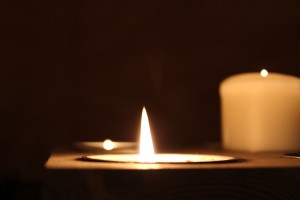I’m in the mist of preparing to a preach a sermon this weekend about God’s lavish love as revealed in His provision through creations beautiful and abundant gifts. I’m privileged to see these gifts often because of where I live. Just today, on a bike ride to and from the grocery store, there was a light show in the sky, painting the already vibrant trees in ever changing of hues of light. Nearly everywhere I looked, people were taking pictures of the sky and trees. Just a few snowflakes fell, and we could, all of us, see each others breath as we made our way through the city on foot and bike. And, it seemed, we were all content.
Meanwhile, there’s a drought in Africa, and Dengue fever is on the rise in central America, more rapidly than ever. It’s also true, undeniably, that there’s more carbon in the atmosphere than there’s ever been, and that we’re filling the air with carbon because of the way we burn energy. Good scholarship, from people who aren’t getting rich on the subject, can be found here. Rick Perry, and all his co-candidates can say “nobody knows why there’s more carbon in the air”, but that’s sort of like telling a drunk that his blood alcohol count needs further investigation because the link between the alcohol in his glass and the alcohol in his blood hasn’t been proven. Meanwhile, shorelines erode, floods destroy houses, crop yields decline, pests destroy forests, insurance rates rise as hurricane season begins earlier. I could go on, but you get the picture.
It’s time to recover our ancient calling as priest of the Lord’s temple, which is the earth (see last Sunday’s sermon, or John Walton’s book). When we do, we’ll realize that we have a calling, as the image bearers of God to reflect God’s love, care, and provision for all the creatures of the earth. That’s what dominion means. Sure, the church has failed to realize this during various times through history, confusing domination with God’s stewarding view of dominion. I’ll talk a bit about our historic failures in a coming sermon, but whatever – those failures are in the past. I’m much more interested in the way forward. How can we recover our calling as stewards, caring for the earth as those who are created in the image of God. Many people have helped shaped my thinking here, so I claim nothing as my own. But here are some values that I believe must be foundational for our daily living if we’re to care for the earth properly.
1. STEWARDSHIP – Say I buy the cheapest coffee. That makes the most sense in a capitalist society, at least to many people. After all, Adam Smith suggested that everyone, acting in their own self interest, will create markets that will increase the prosperity of the whole. Buying cheap encourages competition and productivity. Adam would be proud. But when I do that, I encourage the destruction of rain forests (because by cutting them down, the grower can increase yields, and therefore profits – again a great self-interest move). But these rain forests inhale carbon and exhale oxygen, which is a way of saying that all those trees are very, very good for our earth, and hence for all God’s creatures, and cutting them down ultimately harms us all. A few more pennies, and I buy shade grown coffee, and that encourages people to grow a little less coffee, but spare the trees. This is just one example of stewardship, but let’s extend it out to and ask each day: what can we do to care for our earth? There are endless little things: Walk. Turn the heat down. Compost. Buy local. Take public transport. Light a couple candles, and eat dinner with that light. Skip TV sometimes and talk instead. All this isn’t just good for the earth, it’s good for you, your relationships, good in every way.
2. JUSTICE– Say I buy the cheapest coffee. That means that I buy beans that were purchased by a buyer who blew in and offered a ‘take it or leave it’ price, based on the price of commodities traders in America. Because of competition, some of these pickers are the victims of terribly injustice, just so we can enjoy the cheapest possible coffee. It’s time for this to stop.
That’s why there are people devoted to fair trade coffee, and other items as well. They’re concerned that we who are already wealthy not enslave the growers and pickers by our inherent greed, and desire to save a few pennies. After all, “doing justice”, is one of only three things that God asks of us. Surely we can work at taking this seriously.
3. CONTENTMENT – Let’s say I don’t buy the cheapest coffee. I buy fair trade, shade grown, organic. WOW! I might not be able to have as much coffee. Do you know what that might mean? My addiction will be revealed. I’ll need to drink a bit less, and that might even mean I’ll need to sleep a bit more. I’ll need to stop trying to be the Messiah, stop trying to do everything, be everything. This has actually happened. I’ve cut back on coffee, because I’m tired of living in overdrive. My commitment to buying honest coffee that makes the world a better place means I buy less coffee anyway. I sometimes want more than I consume, but I’m learning, in this simple area, some things about contentment.
This is a great lesson for me. I don’t need a bigger TV, or an X Box. I need friends, laughter, walks in the woods, genuine intimacy with my spouse and God, good conversations, prayer. I need healthy food. I need to give stuff away without fearing that I won’t have enough for my future. I need to be creative, by writing, skiing, climbing, cooking. I need laughter. And here’s the newsflash, none of these things cost money.
We’ve been trying to fill the voids in our souls with stuff, and the real fact is we can’t afford to do that anymore. Our credit cards can’t afford it; our landfills can’t afford it; our forests can’t afford it. Let’s find contentment in what God has given us – because what God has given us is very good.
4. GENEROSITY – “Consumerism isn’t about giving and receiving; it’s about desiring and buying” (Mark Powley). We are, many of us, a little too tight fisted, considering how wealthy many of us are. What if, instead of 10% generosity, we tried 15 or 20? What if we believed, so thoroughly, that God will take care of us like He promises, that we really do give, investing our resources of time and money by pouring them into others in order to be a blessing?
It’s Eugene Peterson who says, “giving is what we do best. It is the air into which we were born. (Yet) some of us desperately try to hold on to ourselves. We look so bedraggled and pathetic doing it, hanging on to the dead branch of a bank account for dear life, afraid to risk ourselves on the untried wings of giving. We don’t think we can live generously because we have never tried. But the sooner we start the better….” The sooner indeed, for every day living with a closed fist, either for greed or fear, is a day utterly squandered.
Of course its true that no single person will solve the mess of global warming. We can sell our cars, turn off our heat, and eat only stuff that grows in our backyards. China’s still building massive coal plants, and the freeways are still jammed with people driving alone. My response?
We were never called to save the world. We’re called to give witness to a different way of living – a way rooted in Christ. As stewards of the earth, in Jesus name, we’re called to stewardship, justice, contentment, and generosity. To the extent that we live into that – we’ll approach the abundance Jesus promised, and shine as lights of hope in the midst of the madness.











